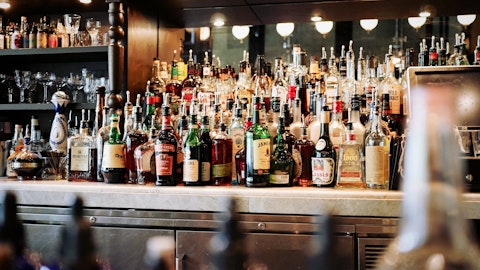So we will continue to support our brands, while searching efficiencies also taking into account that we have had high levels of inflation at the beginning of the year and now with more control. So for me for us, we are just recovering the level of marketing that where we should be also the indicator of percentage of net sales, although we have been doing a very robust price efforts has been a little bit diluted by mix effects. So at the end, business effect also contributed at being having an increase on this ratio.
Thiago Bortoluci: Looks good. Thanks very much, Felipe.
Operator: Thank you very much. Our next question comes from Mr. Fernando Olvera, Bank of America.
Fernando Olvera: Hi. Good afternoon, and thanks for taking my question. The first one is related to Chile. Returning back to volumes. Can you comment what was the performance by channel at beer and soft drinks, if there was a difference? And my second question also in Chile, how are you thinking about your pricing strategy for next year?
Felipe Dubernet: Thank you, Fernando for your question. Regarding the split between beer and nonalcoholic was very similar. We decreased in Chile the volumes around 5.7% — 4.7%. This was the decrease in volume was — it was practically the same in nonalcoholic and beer because we are maintaining market share. So it was industry in both. Temperature affect both categories nonalcoholic and beer and the macro is affecting equally both categories. Also the mix is equally affected in both categories. So overall, that was the explanation. And the second question was about Claudio?
Fernando Olvera: About your pricing strategy for next year.
Felipe Dubernet: Yeah. We have increased again prices. So we are working on revenue — always working in revenue management initiatives. And looking at our promotional rationalization or promotional activities, but also we have increased price now in October in some categories, especially nonalcoholic given the prices that will not improve of some commodities, as I said sugar and orange juices that are putting a lot of pressure in the P&L. So regarding — for the next year, we expect at least increased prices with inflation at least.
Fernando Olvera: Great. That’s very helpful. Thank you so much, Felipe.
Operator: Okay. Thank you very much. Our next question text from Mr. Martin Zicha [ph] from Fundamental Capital. Regarding prices, should we expect CCU to push increase this north of inflation? Do you see space for that entering 2024?
Felipe Dubernet: Prices will depend on many factors. It will depend on input cost as I said, certainly non-alcoholic we should go beyond inflation given the input cost, especially in sugar that is fairly up. Also for your reference sugar prices are double compared to 2019. So, that is a lot. Oranges are more than double compared to 2019. So, I — but it will depend on competition. It will depend on many factors how our brand equity is. But of course if there are opportunities to go beyond inflation we will go forward.
Operator: Thank you very much. Our next question comes from Mr. Henrique Brustolin from BTG Pactual. Please go ahead sir.
Henrique Brustolin: Hello Felipe and Claudio. Thanks for taking my questions. I have two. One — the first one you mentioned that you reduced portfolio complexity right in your remarks. If you could give a little bit more details on that in terms of which categories were — did that take part?
Felipe Dubernet: Hello, we lost you.
Operator: Sorry, I think we lost you for a second. Do you mind just repeating your question please?
Henrique Brustolin: Yes sure. It’s the first one is in terms of the portfolio complexity that means that you wrote that it has been reduced. So, just wondering if you could give more details in terms of the categories that it happened how relevant this might have been for volumes? And if it’s achieving the intended results you planned with it? And the second one on the beer industry in Chile and this is more of a long-term one but we saw a very strong growth in beer volumes in Chile over the past many years. As you mentioned Felipe volumes they remain well above pre-pandemic. And when we look at per capita consumption, it’s now approaching the levels of other markets that were more mature for beer consumption, right? So, I just wanted to hear a little bit more from you in terms of how you see the beer industry performing in Chile in the long run right if growth should sustain the levels of the past or if it might be closer to peak?
Felipe Dubernet: Yes. Okay. No, thank you for your question Henrique. So, regarding complexity yes the program is about to focus on high volume and high margin SKUs. So, if our SKUs has now the right margin and is not providing enough volume simply we believe so we are deleting about 5% of the SKUs. And I think this is typically in this program this should not have especially an impact on margins. And we should run very we should have a lot of discipline especially with innovations to evaluate the innovation if this provides better brand equity is providing better margin? Is this providing better? More high volumes okay you have an entry ticket to enter into the system to launch it. But if you don’t provide strong additional brand equity, it doesn’t provide additional volume, and it doesn’t provide better margin, we will not launch it.
So, that’s in nutshell what is about the complexity program. Regarding your question in beer. Of course, as I mentioned to the first question, our levels of consumption are Hercules is about preserve the scale. And this is what we are doing. Because if I compare the accumulated volumes of the Chile Operating segment, we are talking a very strong volume compared to pre-pandemic volume still. We think that the growth has slowed down or would be maybe in the next few quarters 0% growth. As I highlighted, quarter three was exceptional because of low temperatures. okay? The weather we cannot do nothing about the weather. But we think the consumer has reacted in a good way because, do not consider that we have increased in Chile, the prices more than 13%.



